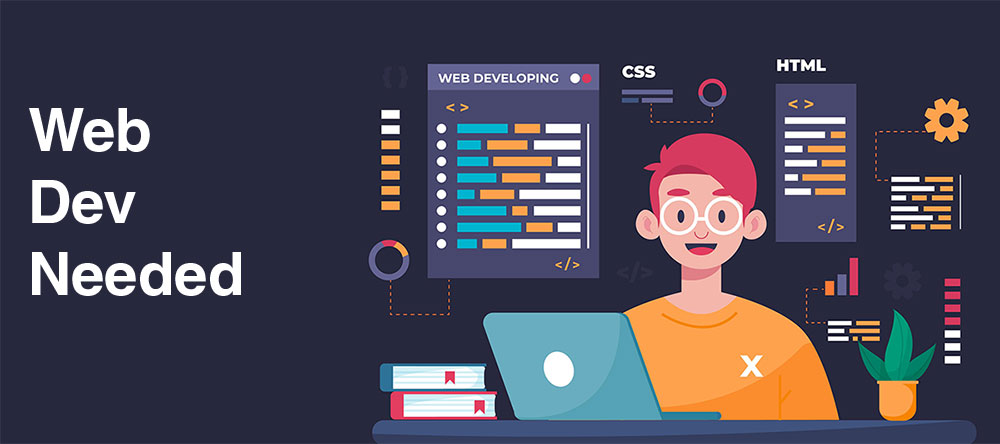The demand for skilled web developers has skyrocketed, leaving many companies struggling to find and hire the right talent for their in-house teams. Whether you’re a scrappy startup or a mammoth corporation, having a skilled web developer on your team can spell the difference between online success and obscurity.
However, the sheer volume of candidates and qualifications can turn the hiring process into a daunting labyrinth. Fret not, for this guide offers a comprehensive blueprint on how to hire a web developer for your in-house team. We cover everything from defining the role to making the offer and onboarding the new team member, ensuring that you’ll find the right fit for your organization.
To hire the ideal web developer for your in-house team, you must have a deep understanding of the role and the necessary skills and experience. In this section, we’ll delve into the multifaceted aspects of the web developer role and provide guidance on crafting a job description that accurately reflects your needs.
Defining the Role
A web developer is accountable for developing and maintaining websites, web applications, and other digital assets for development companies. They usually operate in a team environment and work closely with designers, project managers, and other developers to deliver high-quality products that cater to the organization’s and its customers’ needs.
Web developers can specialize in front-end, back-end, or full-stack development. Front-end developers manage the visual and interactive elements of a website or application, which include layout, design, and user experience (UX). Back-end developers focus on the server-side of a website or application and build the systems and infrastructure that support its functionality. Full-stack developers are skilled in both front-end and back-end development and can work on all aspects of a web development project.
Although the functions seem similar, take note that front-end developers are different from web designers. Web designers are more focused on the visual design, overall appearance, and user experience (UX) of a website. They create the design components or visual elements that will be used on a website such as a layout, color scheme, theme, and more.
Requirements for Experience and Skills
Your organization’s unique needs and the kind of development work you’ll be doing will determine the qualifications and experience needed for a web developer position. Yet, there are a few typical qualifications and backgrounds to consider:
- Proficiency in HTML, CSS, JavaScript, and one or more back-end languages such as PHP, Python, or Ruby
- Experience working with frameworks like React, Angular, or Vue
- Familiarity with database systems like MySQL or MongoDB
- Knowledge of web security best practices
- Experience with version control systems like Git
- Strong problem-solving and analytical skills
- Effective communication and collaboration skills
- A degree in computer science or a related field is a plus but not always required
Developing an Understandable Work Description
Crafting a well-defined job description is a crucial initial step in the process of hiring a top web designer or developer for your in-house team. The job description should accurately reflect the requirements of the position and the necessary skills and experience. Here are some tips for creating an effective job description:
- Clearly define the role and responsibilities of the web developer.
- Specify the required skills and experience, including any relevant programming languages, frameworks, or tools.
- Indicate the desired level of experience, such as junior, mid-level, or senior.
- Highlight any specific web development projects or areas of focus that the developer will be working on.
- Provide information on the company culture and any relevant benefits or perks of the position.
- Use clear and concise language that accurately reflects the organization’s tone and values.
Full-stack Developers vs. Front-end vs. Back-end Developers
When hiring web developers, it’s important to understand the distinctions between front-end, back-end, and full-stack developers.
Front-end developers concentrate on the visual and interactive components of a website or application, such as design, layout, and user experience. Back-end developers create the server-side systems and infrastructure that support the functionality of a website or application.
Full-stack developers are competent in both front-end and back-end development and can work on all aspects of a project.
When hiring a web developer, consider the specific needs of your organization and the type of development work required.
If you need someone to focus on the visual and interactive aspects of a website or application, a front-end developer may be the best fit.
If you require someone to work on the server-side systems and infrastructure, a back-end developer may be the better choice.
A full-stack web developer may be the best option if you require someone who can work on all aspects of a web development project.
Keep in mind that full-stack developers are frequently in high demand and may come at a higher cost than front-end or back-end developers.
Characteristics of a Web Developer
When selecting a web developer for your in-house team, there are a number of criteria to consider in addition to the necessary qualifications and expertise. These characteristics can boost the likelihood of a successful hire and help ensure a suitable fit for your company. Some crucial characteristics to consider include:
- A skilled web developer should be able to adjust to new technologies and approaches as necessary because web development practices and technologies are always changing.
- Precision and Attention to Detail: To make sure that websites and applications work properly and appear beautiful, web development involves accuracy and close attention to detail.
- Creativity: When addressing issues and creating new features and functionality for websites, a competent web developer should be able to think creatively and beyond the box.
- Curiosity: A web developer is more likely to stay up to date on the most recent advancements in the industry if they are curious about new technologies and processes.
- A skilled web developer should be able to collaborate well with designers, project managers, and other developers to produce high-quality products. Web development is frequently a collaborative process.
- A skilled web developer should have a sincere passion for the field and a drive to constantly advance their abilities and expertise.
Identifying Potential Candidates
It’s time to start the hiring process once you have decided on the type of web developer you require and the traits you are looking for.
The actions to take to secure a successful hire for your internal web development team are listed below.
Create a Job Description
To initiate the process of hiringa web developer, crafting an explicit job description is paramount for the web developer role. This job description should include a comprehensive breakdown of the responsibilities, essential skills, and desired attributes that the role demands, ensuring you capture the right talent for your project.
Additionally, it’s crucial to provide specific details about the web development projects that they will undertake, as well as any technical requirements or tools they will need to be proficient with, such as frameworks, programming languages, or development environments.
Moreover, it’s important to integrate information regarding your company’s culture and values into the job description. This strategy is beneficial to attract potential candidates who align with your team’s ethos. By including your company’s mission, vision, and unique perks or benefits, you can communicate a clearer picture of your organization and create a sense of belonging among potential candidates, setting the tone for a productive development environment.
Depending on whether you want to hire locally or internationally, you should always make sure to choose strong recruitment strategies. Putting serious thought into which strategies to use when recruiting can help you narrow down your candidate options and increase your chances of finding the ideal new hire who understands the technical aspects and web standards.
Advertise the Job

After writing a job description, it’s necessary to promote the position to draw in the best web developers for the job. You can spread the word about the position through a variety of platforms, using services such as:
- Job boards: Advertise the position on well-known employment boards like Lensa, Glassdoor, Indeed, and LinkedIn.
- Social media: Post the job opening on the Facebook, Twitter, and LinkedIn pages of your business to reach a wider audience of developers.
- Request recommendations from current coworkers, industry contacts, and colleagues, especially those acquainted with development professionals.
- Recruitment firms: To assist with locating qualified developers, think about collaborating with a recruiting firm that specializes in web development and IT roles.
Review Resumes and Portfolios
After receiving job applications for the web developer position, the next step is to trim resumes and portfolios to identify potential candidates.
You’ll see that some candidates have used various resume builders to stand out. Try not to be impressed by the aesthetics of the resume itself.
The ideal candidate should have the necessary skills and experience specified in the job description (i.e. full-stack web developer, website developer), as well as exhibit traits like innovation, meticulousness, and fervor for web development and design.
While evaluating portfolios, it’s essential to focus on the caliber of work and the types of projects that the candidate has undertaken in the past.
Specifically, look for applicants who have experience working on similar projects to the ones your in-house team will be tackling, ensuring they have the necessary coding expertise. This criterion will ensure a better alignment with the requirements of the job and the web technologies involved.
Conduct Interviews
After identifying potential candidates, which could include front-end, back-end, and full-stack developers, the next step is to conduct interviews to gain further insight into their technical prowess, experience, and suitability for the web developer role.
Various types of interviews can be conducted, including:
- Phone screening: A brief phone interview to evaluate the candidate’s communication skills and ensure that they fulfill the fundamental requirements for the development position.
- Technical interview: An interview that assesses the candidate’s knowledge and expertise in web standards, programming languages, and other essential web technologies.
- Behavioral interview: An interview that assesses the candidate’s compatibility with your company’s culture, development environment, and values.
During the interview process, it’s crucial to ask open-ended questions that allow the candidate to showcase their coding expertise and experience in web design and development.
Additionally, give the candidate an opportunity to ask questions about the role and your company, including queries about specific web projects or development challenges. This helps them determine if the position aligns with their professional development goals.
Check References
Before extending a job offer, it’s vital to verify the candidate’s references, ensuring they have a proven track record in website development and web applications.
It’s recommended to contact a minimum of two references and inquire about the candidate’s coding practices, work style, strengths, and areas that need improvement, especially in terms of technical aspects.
Make a Job Offer
After completing the interview process and verifying the candidate’s references, it’s time to extend a job offer to the chosen candidate, potentially a perfect addition to your development team.
The job offer should be precise and unambiguous, detailing the salary, benefits, and any other pertinent information regarding the role, including any expected web projects.
It’s equally important to be transparent about any potential development challenges or negative aspects related to the job. Providing such information will assist the candidate in making an informed decision about whether or not to accept the job offer.
Onboard the New Hire
After the candidate, potentially your new website developer, has accepted the job offer, it’s essential to onboard them effectively, ensuring they understand the web standards and practices of your company.
This process should entail providing a comprehensive onboarding plan that includes information about company policies, development tools, procedures, and any necessary training for developing websites or web apps.
It’s equally important to introduce the new hire to the rest of the team, which may include other web developers, and facilitate opportunities for them to socialize and connect with their colleagues. This step fosters cohesion and promotes a unified development environment.
Provide Ongoing Support and Feedback
After onboarding the new hire, ensuring their understanding of web technologies and practices, providing continual support and feedback is crucial. This can entail regular check-ins, opportunities for technical training and development, and constructive feedback on their web projects.
Additionally, it’s important to recognize and reward the new hire for their contributions, perhaps in innovative web solutions, and hard work towards the team.
Such recognition can keep the new hire motivated, driving them to constantly advance their web development skills.
Interviewing Candidates

After outlining the job requirements for potential web developers, it’s time to begin the review of resumes and applications. This pre-screening procedure can help to filter out unsuitable candidates and identify those who best fit the intricate requirements of web design and development.
During this process, it’s essential to scrutinize the resumes for relevant indicators of web development experience and skill, such as previous website projects, technical certifications in web technologies, and education.
It’s also crucial to take into account factors like the candidate’s communication abilities and aptitude for collaborative web projects.
Pre-Screening Candidates
After defining the development position requirements, the next step is to review the resumes and applications.
This pre-screening process can aid in narrowing down the potential full-stack, front-end, or back-end developers and identifying the most suitable ones for the web development role.
It’s crucial to scrutinize the resumes for relevant indicators of experience and skill, such as prior web-related work experience, technical certifications, and education in web technologies.
Furthermore, it’s important to consider factors like the candidate’s ability to communicate complex web concepts and aptitude for collaborative development.
Conducting the Interview
In order to gauge a candidate’s expertise in web standards and skill level during an interview, it’s critical to ask the correct questions. Following are some crucial topics to concentrate on in the interview:
Technical Expertise
Inquire specifically about the technical abilities required for the web developer position.
Questions can encompass project management techniques specific to web projects, software tools, and proficiency in various programming languages vital for web design and development.
Skills in Addressing Issues
Inquire about the applicant’s most challenging web development challenge and how they tackled it.
By doing so, you can evaluate their capacity for problem-solving within the web environment and their method of operation.
Communication Skills
Given the interconnected nature of web projects, working as a team requires effective communication.
Inquire about the candidate’s methods for dispute resolution during web projects, collaboration strategies, and communication with both technical and non-technical stakeholders.
The Right Match
When it comes to web development environments, it’s critical to gauge the candidate’s cultural fit with your team.
Probing into their beliefs about web best practices, working style, and coping mechanisms for development-related stress can be enlightening.
Assessing Candidate Performance
After conducting interviews, it’s paramount to evaluate the performance of potential web developers. This assessment can focus on their acumen in web technologies, communication style, and overall compatibility with your development team.
One way to assess candidate performance is through a technical assessment tailored to web projects, such as a coding test or project-based assignment related to website development. This can provide insights into their technical prowess and problem-solving capabilities in web contexts.
Furthermore, conducting reference checks, especially with past web projects or teams, can provide insights into the candidate’s collaborative skills and their ability to mesh with development environments.
Making the Hiring Decision
After assessing the performance of each web development candidate, the next step is to make the hiring decision for the web developer role.
It’s essential to take into account the requirements of your web team and company culture, as well as the candidate’s technical skills in web technologies, communication abilities in the context of web projects, and overall compatibility with your development team.
Once you’ve made a hiring decision for a web developer, it’s crucial to communicate the decision clearly with the candidate. Provide them with information about their role in website development and responsibilities, as well as the expectations for their performance in the web environment.
Additionally, offering a clear onboarding process tailored to web design and development can help ensure a seamless transition into your team.
Common Interview Mistakes to Avoid
There are certain typical errors that interviewers make during the web developer recruitment that can hurt their chances of getting the right fit. Here are some things to stay away from:
Asking Forbidden Questions
When hiring for web roles, the validity and lack of discrimination of interview questions must be ensured. Avoid asking questions about a candidate’s age, gender, color, religion, or physical limitations.
Too Much Emphasis on Technical Skills
While technical proficiency in web standards is crucial, it’s also essential to take into account a candidate’s soft skills, such as their capacity for communication and problem-solving within the web environment.
Overemphasizing technical abilities in web technologies may cause applicants who would make ideal team members for web projects to go unnoticed.
Rushing the Interview Process
Rushing an interview, especially for web development roles, might result in a hiring choice being made before the candidate’s skills and fit within the web team have been thoroughly evaluated.
Spend some time conducting in-depth interviews and getting input from other team members who were involved in the web developer hiring process.
Commonly Asked Interview Questions
Consider the following frequently asked interview questions when selecting candidates for your internal web development team:
Can you give an example of a web project you worked on in the past that was extremely difficult and how you overcame it?
By asking them this question, you can evaluate a candidate’s capacity for problem-solving within the web context and their method of operation.
What software tools and programming languages crucial for web design and development do you have the most familiarity with?
You can determine the candidate’s technical expertise and experience in web technologies by using this question.
How do you resolve disputes or conflicts during web projects with team members?
This query can reveal information about the applicant’s capacity for cooperation and communication within web environments.
Can you describe a situation in which you had to quickly learn a new programming language or piece of technology for web design or web app development?
Using this question, you can judge a candidate’s capacity for rapid learning and technological adaptation in the web environment.
What new programming languages or technologies crucial for web development have you learned recently?
Being adaptable to changes and innovations in web technologies is one of the key characteristics of a good web developer. Web developers, especially those focused on web design and development, must always be willing to learn new programming languages to improve their skill sets in the web environment.
What web platforms crucial for website development do you have experience with? Which one(s) do you like most, and why?
There is a wide variety of website builders and eCommerce platforms like Magento, WordPress, Shopify integration, Elementor, and more relevant to the web context.
Take note of the web platforms that the candidate prefers the most in the web environment. This question will help you determine the extent of the candidate’s experiences and skill sets in web technologies.
It will also highlight if the candidate understands the advantages and disadvantages of using such web platforms for web projects.
How comfortable are you with writing HTML entirely by hand for web design? (Conduct an exercise afterward)
As we’ve highlighted before, resumes don’t always reflect a person’s real technical abilities in web design and development, but resumes constructed with a resume builder grant an additional edge. Many web developers claim expertise in web standards like HTML, yet they aren’t comfortable crafting an HTML document by hand.
As a business owner, naturally, you aspire to derive maximum value. Ensure that when offering a premium salary to a web developer, you are rewarding someone who can author a foundational HTML document without resorting to external resources for web projects.
Regarding the exercise, furnish a sample web design and prompt the candidate to script the HTML for it.
Projects They Have Worked On in the Web Context
A judicious method to discern the right developer is to delve into the candidates’ prior web projects. Request candidates to furnish a portfolio of their antecedent web undertakings, or access to their live web designs. This aids in assessing the functionality of the websites they’ve crafted and gauging if their expertise aligns with your enterprise’s needs and benchmarks.
Probe further by inquiring if they maintain a blog site, an online repertoire of the websites and UX designs they’ve birthed, code excerpts of a solution they cherish, or a reusable widget or system pivotal to web development.
Making the Offer and Onboarding
It’s time to make the offer and onboard the ideal individual for your internal web development and design team once you’ve pinpointed them. For this technique, geared towards achieving web project excellence, keep the following in mind:
Making the Offer
When courting your prospective web developer or designer, it’s pivotal to ensure the terms of your offer are lucid and unequivocal. The following actions, rooted in web environment best practices, should be taken:
With the HR and legal teams, discuss the offer in the context of web development.
Before submitting, vet the offer for adherence to all statutes pertinent to web design and web app development, collaborating with your HR and legal divisions.
Detail the Compensation and Perks for the Web Development Role
Furnish a comprehensive delineation of the remuneration and perquisites, encompassing salary, bonuses, health provisions, retirement schemes, and other stimuli that might appeal to someone in the web context.
Set Expectations Concerning Commencement Date and Role Obligations in Web Technologies
Be explicit about the candidate’s onset and the gamut of their responsibilities in web development. This precision will expedite their effortless amalgamation into the team.
Be Primed to Parley
If the situation warrants, stand ready to discuss the offer’s nuances, perhaps negotiating on compensation or perks pertinent to the web environment.
Onboarding for Web Development Roles
To usher in new recruits adeptly into web design and development, the onboarding process is paramount. These steps, tailored for web context, should be heeded:
Present an Exhaustive Onboarding Strategy for Web Development
Endow the newcomer with an encompassing onboarding schema that elaborates on the company, the web team, and their duties related to web technologies.
Allocate a Guide or Companion Familiar with Web Standards
Delegate to the novice a seasoned ally or mentor, adept in web design and web app development. This individual will be instrumental in addressing queries and facilitating the induction phase.
Provision Tools and Apparatus Relevant to Web Projects
Ensure the new entrant has the requisite assets for website development, inclusive of computing devices, software entitlements, and enterprise systems tailored for web technologies.
Acquaint the New Recruit with the Web Development Team
Catalyze camaraderie by presenting the new addition to the existing web design cohort. This might mean orchestrating team meals or convivial assemblies geared towards fostering a unified web development team.
Afford Continuing Learning and Evolution Avenues in Web Technologies
Empower the recruit with avenues for perpetual learning in web development, aiding their ascent in their role and keeping them updated with industry oscillations and emergent web standards.
Questions to Ask Before Hiring a Web Developer for Web Projects
Before embarking on web design and development projects, it’s pivotal to elucidate your objectives and prerequisites for your business venture.
When thinking of hiring web designers and developers, mull over these cardinal inquiries:
Is this a newly minted Web Design or Development Role?
Ascertain that you’re recruiting for a fresh, unique position within the web environment, ensuring you’re not shelling out a top-tier remuneration for a role that’s pre-existing.
Is the Web Development Workload Uniform Day by Day?
Peruse and dissect your digital marketing demands annually. Gauge if the role is truly consistent, and if the recruit can operate at peak efficacy, especially during times like seasonal promotions.
Is your web project workload heavier during festive seasons? Are there quarterly drives? Or perhaps the impetus is to promote expansive corporate gatherings?
Have You Allocated Adequate Funds to Onboard the Necessary Web Design and Development Talent?
Financial allocation is the linchpin before sanctioning the enlistment of an internal web development team. Which avenue is economically viable?
Engaging a third-party web development agency or remunerating a salaried employee? Collaborating with an Employer of Record (EOR) can streamline the recruitment phase.
They oversee payroll, perks, taxation, stock entitlements, and regional conformity, enabling you to concentrate on your core web team. It’s crucial to juxtapose the merits, demerits, and stipulations like holiday compensation, medical coverage, and pension benefits when drawing parallels between the two strategies.
Conclusion
In summation, if the objective is to draft web developers or designers for your in-house brigade or amplify your proficiencies, consider sourcing LATAM developers. Navigating the web context can be intricate, but by adhering to these guidelines, you bolster the odds of pinpointing the ideal professional.
Opting for in-house recruitment is ideal for entities aiming to upscale their operations and infuse advanced features beyond rudimentary customer relationship management (CRM).
Embark by outlining your recruitment objectives and benchmarks, followed by crafting a compelling web development job profile to allure top-tier talent.
During the evaluation phase, prioritize the candidate’s competencies, past engagements, and synergy with the team in the web environment.
Upon discerning the apt web developer or designer, present them with an unequivocal proposition and a holistic induction strategy to guarantee their flourishing.
By adhering to this modus operandi, you can cultivate a formidable web development team primed to catapult your enterprise to greater heights.
If you liked this article on hiring a web developer, you should check out this one about what a software development budget implies.
We also wrote about a few related subjects like how to write an RFP, ALM tools, hire a web development team, application lifecycle management, and web development companies in Serbia.
- Business model vs business plan: What’s the difference between them - February 6, 2024
- What Is A Project Management Framework? (Must Read) - October 15, 2023
- What is an IT Project Manager and What Do They Do? - October 11, 2023









